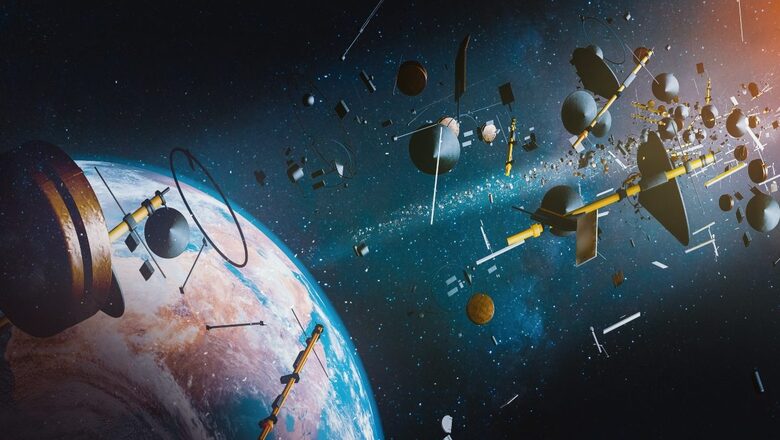
views
Japan plans to launch a satellite made of wood in 2024 and relevant tests have largely been completed aboard the International Space Station (ISS). Life has come full circle since the first ever aircraft, flown by the Wright brothers, was made of wood.
The space sector has grown exponentially in both quantitative and qualitative terms. From the launch of Sputnik on October 04, 1957, it took almost five decades to reach 1000 simultaneous active satellites in space and in less than two decades, there are more than 5000 of them with SpaceX alone planning to launch 42,000 soon enough.
Declassified information of the National Reconnaissance Office (NRO) of the USA revealed in its published work ‘The Corona Story’ that the photo films taken from space by the spy satellite Corona used to be hurled down to Earth through a re-entry vehicle to be caught midair by the crew of C-130 aircraft, developed in a lab and made available weeks later. There’s now a talk of building crisis reconnaissance capability that would furnish ready-to-use satellite imagery right in the fighter cockpit in real-time. But all this would take place away from the public scrutiny and concern.
The general public does not appear to be concerned with space because the activities in space, while influencing everyday life, do not appear to threaten life, at least not yet. Space-enabled operations such as GPS-assisted driving, ATM cash withdrawal, ‘Direct to Home’ television viewing, or working from home using high-speed internet draw little attention to the fact that their source can be interfered with in space. Initially, the defence forces’ dominance in space utilisation did act as a barrier but even with sizeable commercialisation of it, the public interest has not been commensurate to its rapid pace of development. It clearly is a case of “out of sight out of mind.”
Responsible behaviour cannot be instilled anywhere without public participation and space is no exception. Take the case of debris in space. As per the European Space Agency (ESA)’s Environment Report 2022, there are about 30,000 pieces of debris in space and the number of objects measuring more than one cm could be more than one million. One of the advantages presented in favour of the wooden satellite is that it would burn off completely on re-entry, leaving little debris in space. On December 07, 2020, in its 37th plenary session. the UN General Assembly adopted Resolution 75/36 on responsible behaviour in space. In less than a year from that, Russia’s ASAT test on November 15, 2021, created at least 1500 trackable pieces of debris. Following that, US Vice President Kamala Harris announced on April 18, 2022, that the United States would ban direct-ascent anti-satellite (ASAT) missile tests that create orbital debris. It’s not a regulation though, only a declaration. The point is that nations, at times, do not take UN resolutions seriously or listen to the concerns of others. Governments are only accountable to the public, at least in democracies, and will only respond to public concerns. As a result, the public must become involved and call for responsible space behaviour from their respective nations.
Without a doubt, space is vast, so the debris in space does not appear to be causing any concern to the average person on the street. However, even the oceans are huge but plastic in oceans has started to disturb the mankind. It’s not far when this debris will start interfering with the assets in space, affecting life on Earth. Space crowding did not take place as long as the military was the primary user, but commercial considerations have changed the scenario. Privatisation of space has opened up the economy and while technology readiness is very high, the industry maturity is still very low. The industry seems to be satisfied at the product level, whereas it needs to be part of the process. The new entities are keen to deploy their assets in space, but they don’t have the big picture to protect their assets. The ratio of upstream to downstream is still very small. There’s only one Elon Musk in the whole world and probably, even he is not sure how to protect his assets in space. It is yet not clear if an attack on a Starlink satellite will amount to an attack on the US. The complete growth seems to be focused on commercial output with scant regard to the safety of assets. Space is one sector where technology has overtaken regulations.
Research from the RAND Corporation has emphasised the urgent requirement for International Space Traffic Management Organisation (ISTMO) as a response to the bloating population of active satellites and other debris orbiting Earth, which is bringing the world closer to a critical tipping point in space traffic management (STM). US Department of Defence (DoD), on March 03, 2023, released guidelines for safe and responsible space operations. While issuing these guidelines on February 09, 2023, defence secretary Lloyd Austin laid out tenets of responsible behaviour in space covering areas of cooperation, debris control and shared communication to bring in transparency. But these guidelines apply only to military operations, not civil or commercial.
Talk of weaponisation of space, and it’s just brushed aside as unlikely, but is that even logical or simply wishful thinking? Article IV of the Outer Space Treaty of 1967 prohibits placing nuclear weapons or Weapons of Mass Destruction in orbit or on celestial bodies. It, however, is silent on conventional weapons. Ballistic missiles transiting through space or the missiles used for anti-satellite tests, therefore, do not violate the treaty, though are dangerous enough to threaten the assets of others. Further, Article IV does not allow the establishment of military bases on celestial bodies, but at the same time does not prohibit the use of military personnel for scientific research. Article II of the treaty does not allow ownership of any space asset by any country but the US government introduced the Space Act 2015 which states that US citizens may engage in the commercial exploration and exploitation of space resources. It introduced a new title, expanding the acronym SPACE — ‘Spurring Private Aerospace Competitiveness and Entrepreneurship.’ Different asteroids are supposed to be resource-rich and will be exploited for the same. There are no regulations on who can explore what and as of now, finders are the keepers.
The question is if a country finds resources on a celestial body, who is going to guard those resources? Who guards the resources on Earth? Only military can guard the resources and it can’t do so without weapons. Space is becoming congested, contested and competitive. Competitiveness among finders will lead to denial of exploration to other players, making it hard for peaceful exploits. Society cannot close its eyes to the perils staring it in the face. If debris is a cause of concern, debris removal may become another monster to handle. As per a report in Fortune Business Insights, the global space debris monitoring and removal market is projected to grow from $942.3 million in 2022 to $1,527.7 million by 2029. There seems to be a contradiction here. How does debris removal market grow and then sustain without the presence of debris? While on one hand, nations are expected to exhibit responsible behaviour in space and not create debris, but on the other hand, the debris removal industry can only grow if debris grows. Even bigger cause of concern is debris removal tools falling into the wrong hands, eventually endangering the legitimate satellites.
For far too long, space has been dominated by technology and the military, so developing space-related rules and regulations has always been the responsibility of space scientists or government agencies dealing with space. However, commercial applications based on space assets are rapidly changing this. Life’s routine activities will be space-dependent, and damage to a space asset tomorrow, implying in the near future, will have the same effect on life as an attack on a transformer. Space is no longer just a technical issue, it has also become a sociological issue. Debates on space issues must follow the same pattern as nuclear debates, and scholars from all disciplines must actively participate. To paraphrase Premier Georges Clemenceau, “Space is too important to be left to space scientists.”
The author is a retired fighter pilot, former Air Advisor at High Commission of India, London and Director General (Inspection & Safety), Indian Air Force. Views expressed are personal.














Comments
0 comment